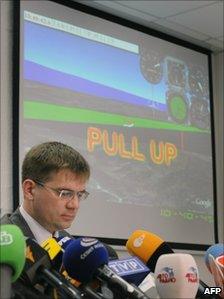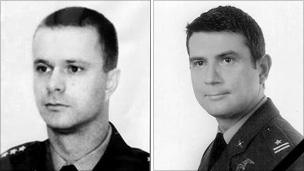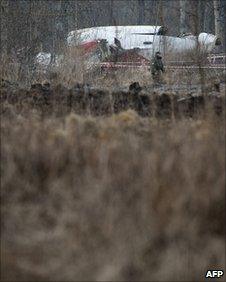Kaczynski air crash: Russia blames Polish pilot error
- Published

Russian investigators took reporters through the airliner's final minutes
Russia has blamed the Smolensk air crash which killed the Polish president and nearly 100 other people in April on Polish pilot error.
The Polish crew failed to heed bad weather warnings because they were afraid of displeasing President Lech Kaczynski, Russian investigators said.
The pilots were driven to take "unjustified risk", they found.
Poland's interior minister accepted the findings but said Russian officials had also been at fault.
Polish Prime Minister Donald Tusk cut short a holiday in response to the report and was returning to Poland for talks with the minister, Jerzy Miller.
In other reaction, Lech Kaczynski's twin brother Jaroslaw condemned the Russian report as a "joke against Poland", saying the Russian investigators had failed to produce evidence.
Russia's handling of the disaster had previously been widely commended.
President Lech Kaczynski and 95 others, spanning the country's military and political elite, were killed when their airliner crashed while trying to land in heavy fog near the western Russian city of Smolensk. There were no survivors.
They had been on their way to a memorial ceremony for Poles massacred by Stalin's secret police at Katyn during World War II.
'Repeatedly informed'
As the state on whose territory the accident occurred, Russia was responsible for conducting the investigation and producing the official report on the crash.
Tatyana Anodina, head of the Inter-state Aviation Committee (Mak) in Moscow, told reporters in Moscow that the Soviet-made Tu-154 airliner had been in good condition when it took off from Warsaw en route to Smolensk's Severny airport, and it suffered no engine or flight system failures.
Before impact, there was no fire, explosion or other damage in the air, she continued.
The disaster resulted directly, she said, from the crew's failure to heed weather warnings and land at a different airport.
"During the flight, the crew were repeatedly informed of inadequate weather conditions at the destination airport," she said.
"Despite this, the crew of the Tu-154 did not take a decision to switch to a back-up airfield. This may be considered as the start of the extreme situation aboard the plane."
The Russian investigation found "substantial deficiencies" in the training given to Captain Arkadiusz Protasiuk and his co-pilot, Major Robert Grzywna, Ms Anodina said.
The two men had feared a "negative reaction" from President Kaczynski if they switched to the other airfield, according to the Russian investigator.
"The main passenger's expected negative reaction... placed psychological pressure on crew members and influenced the decision to continue the landing," she said.
The jet's flight recorder caught one of the crew saying "He'll get mad", in an apparent reference to the Polish president's determination not to alter his schedule.
'Landing at any cost'
Poland's air force commander, Gen Andrzej Blasik, added to the pressure by entering the flight deck, Ms Anodina noted.

The jet was piloted by Captain Arkadiusz Protasiuk (left) and Major Robert Grzywna
"The presence of the Polish air force commander on the flight deck up to the aircraft's impact with the ground put psychological pressure on the crew captain to decide on continuing descent in a situation of unjustified risk, dominated by the goal of making a landing at any cost," she said.
According to pathology tests, alcohol was found in the blood of Gen Blasik in a concentration of 0.6 grams per litre - just above the drink-driving limit for most EU states.
Investigators found that a top Polish foreign ministry official, Mariusz Kazana, had also entered the flight deck at one point.
At the news conference in Moscow, they played back the flight recorder tape of the pilots' final minutes, including conversations with Russian air traffic controllers.
Just before the recording ends, an automatic recorded message in English from the plane's Terrain Awareness and Warning System can be heard exhorting the crew to "pull up, pull up".
'No proof'
"We are not disputing the criticism of the Mak towards the Polish side," Interior Minister Miller told reporters in Warsaw.

The crash traumatised Poland
"We would have made the same criticisms, it's obvious to us."
But he added that Russian air traffic controllers on the ground at the remote airport in Smolensk had also been at fault.
"In our opinion, neither the Polish nor the Russian side was prepared for the safe realisation of that flight," he said.
Polish MEP Pawel Zalewski told the BBC World Service that the Russian air traffic controllers should have closed Severny airport because of the bad weather.
In December, Mr Tusk described a draft of the Russian report as "unacceptable", saying some of its conclusions were unfounded.
Mak official Alexei Morozov said on Wednesday that the report had found no fault with the Russian air traffic controllers, who "gave no permission to land".
But he added that the report had been amended with regard to technical criticisms made by Polish investigators.
Jaroslaw Kaczynski, who is a former Polish prime minister, said that the Russian report put "the entire blame on Polish pilots and Poland without any proof".
Dismissing the report's suggestion that his brother might have put psychological pressure on the pilots to land the plane, he said: "My brother did not show suicidal tendencies."
In other reaction, Polish lawyer Rafal Rogalski, who represents relatives of some of the dead, rejected the Russian report as an "absolute scandal".
"The families want the truth... not the presentation of just one side without considering arguments which lie also on the Russian side," he said.
Your comments in reaction to the findings
I understand that two things took place: 1) The pilots have decided to begin the landing procedure when they should've aborted and gone for another airport. 2) Airport operators allowed the plane to land when they should've closed the landing belt. We should not argue whether it was Polish or Russian fault, because the common denominator is that both pilots and operators operated under pressure from their superiors (generals, in both cases). And that is the reason, in my opinion. The Mak report looks like it was supervised with a superior in mind too. Michael, Warsaw, Poland
As a foreigner living in Poland, I have heard all the news regarding the Smolensk disaster. I feel that the objective truth is sadly being forsaken with each side blaming the other. Unfortunately the final decision to land lies with the pilot and that is the bottom line here - "no conditions to land" means just that. Geoff, Lodz, Poland
To the powers in Poland: Don't try to find a political implication in the investigation's result. Tragedy isn't a matter for different political games. Olga, Moscow, Russia
This has left no doubt that the pilot was at fault. On the other hand he was under pressure from President Kaczynski, who wanted to land to attend the ceremony to mark the Katyn anniversary, which was supposed to start a few hours after landing. It's a hard case to judge. Marcin, Krakow, Poland
In my opinion, both sides are to blame. The case is very complex, but the Russian report is absolutely unreliable. There is no information about the technical aspects of the old airport where the crew was supposed to land and no information about the Russian air traffic controllers. There is also no evidence for the judgments the Russians have made about the Polish pilot and the crew. Monika, Warsaw, Poland
All these circumstances fit the way Poland is governed in almost every field. Everything is decided at the last moment. It sometimes leads to complete confusion in many spheres. It's good that this has been publicly spoken about at last. And it must have been done from outside the country for Polish people to be strongly shaken up. It's an unheard of scandal, that's what it is. Complete loss of face for the Polish political class, which must be replaced. Polish voters should be aware all of this, and they've got a chance to do something about it. Krzysztof Grygiel, Poland
This state of affairs has been caused by the Polish government, who from the outset decided to leave the investigation in the hands of the Russians. I was hoping that they would explain the causes of the disaster in a fair way. Shame. Luke Nowak, Warsaw, Poland
- Published17 December 2010